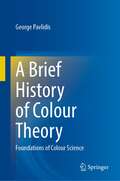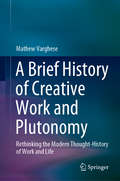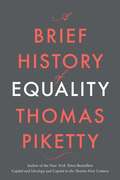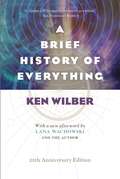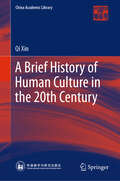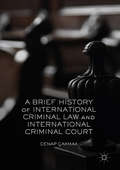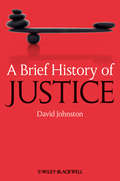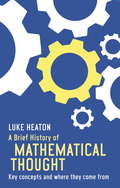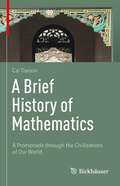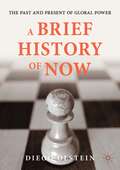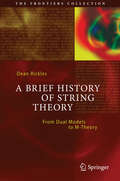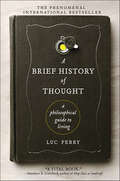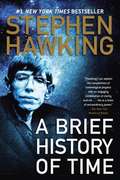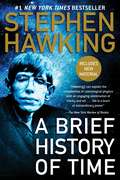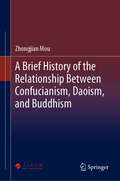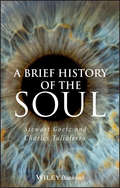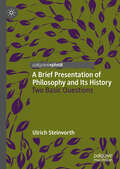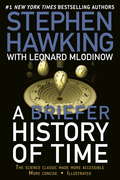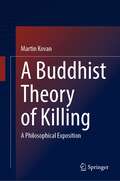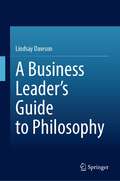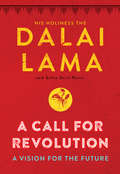- Table View
- List View
A Brief History of Colour Theory: Foundations of Colour Science
by George PavlidisThis book offers a comprehensive introduction in to the various theories of colour and how they developed over the centuries and millennia. As colour is the perception of light by our brains, the book captures not only the physical phenomena but also psychological and philosophical aspects of colours. It starts with ancient studies of Greek philosophers and their insights into light and mirrors, then reviews the theory of colors in the middle ages in Europe and Middle East. The last big part of the book explains the theories of colours by modern scientists and philosophers, starting with Isaac Newton and ending colour schemes of modern digital pictures.
A Brief History of Creative Work and Plutonomy: Rethinking the Modern Thought-History of Work and Life
by Mathew VargheseThis book discusses the influence of creative work on human life, and the role it has played in shaping human civilization since antiquity. To do so, it analyzes the history of thought on creative work from three civilizations: Greek, Indian, and Chinese, as well as contemporary neurological studies on consciousness. According to the classical Greeks, humans are instinctively predisposed to use creative work to gain truth, wisdom and happiness; the Indians consider that Dharma (duty, morality, etc.) can be achieved only through work (karma); and for the Chinese, creative work is needed to attain the supreme wisdom (Dao). Modern studies on consciousness show that our brain creates a personal self-model (ego tunnel) when we learn things creatively, and developing such skills provides lifelong protection for the brain. In the 21st century, human involvement in creative work is declining as we use mechanized systems to gain more and more profit, but the wealth falls into the hands of the few superrich: the Plutonomy. As creative work is taken over by AI systems, human work is reduced to operating those machines, and this in turn leads to an exponential growth in the number of part-time workers (Precariat). The declining value of human life today is a consequence of this change in society. Further, reducing creative work means we have no way to distribute wealth, nor do we have any means to address problems like the lack of enthusiasm in the young; the health crisis due to lack of physical activity; or the environmental crisis due to the high demand for energy to run mechanized systems. This book explores these issues.
A Brief History of Equality
by Thomas PikettyThe world’s leading economist of inequality presents a short but sweeping and surprisingly optimistic history of human progress toward equality despite crises, disasters, and backsliding. A perfect introduction to the ideas developed in his monumental earlier books. It’s easy to be pessimistic about inequality. We know it has increased dramatically in many parts of the world over the past two generations. No one has done more to reveal the problem than Thomas Piketty. Now, in this surprising and powerful new work, Piketty reminds us that the grand sweep of history gives us reasons to be optimistic. Over the centuries, he shows, we have been moving toward greater equality. Piketty guides us with elegance and concision through the great movements that have made the modern world for better and worse: the growth of capitalism, revolutions, imperialism, slavery, wars, and the building of the welfare state. It’s a history of violence and social struggle, punctuated by regression and disaster. But through it all, Piketty shows, human societies have moved fitfully toward a more just distribution of income and assets, a reduction of racial and gender inequalities, and greater access to health care, education, and the rights of citizenship. Our rough march forward is political and ideological, an endless fight against injustice. To keep moving, Piketty argues, we need to learn and commit to what works, to institutional, legal, social, fiscal, and educational systems that can make equality a lasting reality. At the same time, we need to resist historical amnesia and the temptations of cultural separatism and intellectual compartmentalization. At stake is the quality of life for billions of people. We know we can do better, Piketty concludes. The past shows us how. The future is up to us.
A Brief History of Everything
by Ken Wilber"A Brief History of Everything is an altogether friendly and accessible account of men and women's place in a universe of sex, soul, and spirit, written by an author of whom New York Times reporter Tony Schwartz says: "No one has described the path to wisdom better than Ken Wilber."
A Brief History of Fascist Lies
by Federico FinchelsteinIn this short companion to his book From Fascism to Populism in History, world-renowned historian Federico Finchelstein explains why fascists regarded simple and often hateful lies as truth, and why so many of their followers believed the falsehoods. Throughout the history of the twentieth century, many supporters of fascist ideologies regarded political lies as truth incarnated in their leader. From Hitler to Mussolini, fascist leaders capitalized on lies as the base of their power and popular sovereignty.This history continues in the present, when lies again seem to increasingly replace empirical truth. Now that actual news is presented as "fake news" and false news becomes government policy, A Brief History of Fascist Lies urges us to remember that the current talk of "post-truth" has a long political and intellectual lineage that we cannot ignore.
A Brief History of Fascist Lies
by Federico Finchelstein"There is no better book on fascism's complex and vexed relationship with truth."—Jason Stanley, author of How Fascism Works: The Politics of Us and Them In this short companion to his book From Fascism to Populism in History, world-renowned historian Federico Finchelstein explains why fascists regarded simple and often hateful lies as truth, and why so many of their followers believed the falsehoods. Throughout the history of the twentieth century, many supporters of fascist ideologies regarded political lies as truth incarnated in their leader. From Hitler to Mussolini, fascist leaders capitalized on lies as the base of their power and popular sovereignty. This history continues in the present, when lies again seem to increasingly replace empirical truth. Now that actual news is presented as "fake news" and false news becomes government policy, A Brief History of Fascist Lies urges us to remember that the current talk of "post-truth" has a long political and intellectual lineage that we cannot ignore.
A Brief History of Human Culture in the 20th Century (China Academic Library)
by Qi XinThis book examines the cultural concepts that guided the development of the “age of mankind”— the changes that took place in historical, philosophical, scientific, religious, literary, and artistic thought in the 20th century. It discusses a broad range of major topics, including the spread of commercial capitalism; socialist revolutions; the two world wars; anti-colonialist national liberation movements; scientific progress; the clashes and fusion of Eastern and Western cultures; globalization; women’s rights movements; mass media and entertainment; the age of information and the digital society. The combination of cultural phenomena and theoretical descriptions ensures a unity of culture, history and logic. Lastly, the book explores the enormous changes in lifestyles and the virtualized future, revealing cultural characteristics and discussing 21st -century trends in the context of information technology, globalization and the digital era.
A Brief History of International Criminal Law and International Criminal Court
by Cenap ÇakmakThis book offers a historical presentation of how international criminal law has evolved from a national setting to embodying a truly international outlook. As a growing part of international law this is an area that has attracted growing attention as a result of the mass atrocities and heinous crimes committed in different parts of the world. Çakmak pays particular attention to how the first permanent international criminal court was created and goes on to show how solutions developed to address international crimes have remained inadequate and failed to restore justice. Calling for a truly global approach as the only real solution to dealing with the most severe international crimes, this text will be of great interest to scholars of criminal justice, political science, and international relations.
A Brief History of Justice
by David JohnstonA Brief History of Justice traces the development of the idea of justice from the ancient world until the present day, with special attention to the emergence of the modern idea of social justice. An accessible introduction to the history of ideas about justice Shows how complex ideas are anchored in ordinary intuitions about justice Traces the emergence of the idea of social justice Identifies connections as well as differences between distributive and corrective justice Offers accessible, concise introductions to the thought of several leading figures and schools of thought in the history of philosophy
A Brief History of Mathematical Thought: Key concepts and where they come from
by Luke HeatonMathematics is a product of human culture which has developed along with our attempts to comprehend the world around us. In A Brief History of Mathematical Thought, Luke Heaton explores how the language of mathematics has evolved over time, enabling new technologies and shaping the way people think. From stone-age rituals to algebra, calculus, and the concept of computation, Heaton shows the enormous influence of mathematics on science, philosophy and the broader human story.The book traces the fascinating history of mathematical practice, focusing on the impact of key conceptual innovations. Its structure of thirteen chapters split between four sections is dictated by a combination of historical and thematic considerations. In the first section, Heaton illuminates the fundamental concept of number. He begins with a speculative and rhetorical account of prehistoric rituals, before describing the practice of mathematics in Ancient Egypt, Babylon and Greece. He then examines the relationship between counting and the continuum of measurement, and explains how the rise of algebra has dramatically transformed our world. In the second section, he explores the origins of calculus and the conceptual shift that accompanied the birth of non-Euclidean geometries. In the third section, he examines the concept of the infinite and the fundamentals of formal logic. Finally, in section four, he considers the limits of formal proof, and the critical role of mathematics in our ongoing attempts to comprehend the world around us. The story of mathematics is fascinating in its own right, but Heaton does more than simply outline a history of mathematical ideas. More importantly, he shows clearly how the history and philosophy of maths provides an invaluable perspective on human nature.
A Brief History of Mathematical Thought: Key concepts and where they come from (Brief Histories)
by Luke HeatonMathematics is a product of human culture which has developed along with our attempts to comprehend the world around us. In A Brief History of Mathematical Thought, Luke Heaton explores how the language of mathematics has evolved over time, enabling new technologies and shaping the way people think. From stone-age rituals to algebra, calculus, and the concept of computation, Heaton shows the enormous influence of mathematics on science, philosophy and the broader human story.The book traces the fascinating history of mathematical practice, focusing on the impact of key conceptual innovations. Its structure of thirteen chapters split between four sections is dictated by a combination of historical and thematic considerations. In the first section, Heaton illuminates the fundamental concept of number. He begins with a speculative and rhetorical account of prehistoric rituals, before describing the practice of mathematics in Ancient Egypt, Babylon and Greece. He then examines the relationship between counting and the continuum of measurement, and explains how the rise of algebra has dramatically transformed our world. In the second section, he explores the origins of calculus and the conceptual shift that accompanied the birth of non-Euclidean geometries. In the third section, he examines the concept of the infinite and the fundamentals of formal logic. Finally, in section four, he considers the limits of formal proof, and the critical role of mathematics in our ongoing attempts to comprehend the world around us. The story of mathematics is fascinating in its own right, but Heaton does more than simply outline a history of mathematical ideas. More importantly, he shows clearly how the history and philosophy of maths provides an invaluable perspective on human nature.
A Brief History of Mathematics: A Promenade through the Civilizations of Our World
by Tianxin CaiThis volume, originally published in China and translated into four other languages, presents a fascinating and unique account of the history of mathematics, divided into eight chronologically organized chapters. Tracing the development of mathematics across disparate regions and peoples, with particular emphasis on the relationship between mathematics and civilization, it examines mathematical sources and inspirations leading from Egypt, Babylon and ancient Greece and expanding to include Chinese, Indian and Arabic mathematics, the European Renaissance and the French revolution up through the Nineteenth and Twentieth Centuries. Each chapter explores connections among mathematics and cultural elements of the time and place treated, accompanying the reader in a varied and exciting journey through human civilizations. The book contemplates the intersections of mathematics with other disciplines, including the relationship between modern mathematics and modern art, and the resulting applications, with the aid of images and photographs, often taken by the author, which further enhance the enjoyment for the reader. Written for a general audience, this book will be of interest to anyone who's studied mathematics in university or even high school, while also benefiting researchers in mathematics and the humanities.
A Brief History of Now: The Past and Present of Global Power
by Diego OlsteinExploring the rise and fall of global power from the mid-nineteenth century, this book tracks the long and interrelated trajectories of the most serious challenges facing the world today. Although at first the urgency of the coronavirus outbreak in 2020 seemed to take precedence over other global problems such as socioeconomic inequality and climate change, it has ultimately exacerbated these issues and created opportunities to address them boldly and innovatively. A Brief History of Now provides a bird’s-eye view of world hegemony, economic globalization and political regimes as they have evolved and developed over the last two hundred years, providing context and insights into the forces which have shaped the Western world. Presented in an accessible and engaging narrative, the book addresses key contemporary challenges and explores the repercussions of a technological revolution, the potential instability of democracy over the coming years, and the urgent struggle to tackle climate change. With his book, Diego Olstein helps to answer pressing questions about our world today and provides a roadmap for analysing future trajectories.
A Brief History of Schooling in the United States: From Pre-Colonial Times to the Present (The Cultural and Social Foundations of Education)
by Edward JanakThis book presents a sweeping overview of the historical and philosophical foundations of schooling in the United States. Beginning with education among the indigenous peoples of the Americas and going on to explore European models of schooling brought into the United States by European colonists, the author carefully traces the arc of educational reform through major episodes of the nation’s history. In doing so, Janak establishes links between schools, politics, and society to help readers understand the forces impacting educational policy from its earliest conception to the modern day. Chapters focus on the philosophical, political, and social concepts that shaped schooling of dominant and subcultures in the United States in each period. Far from being merely concerned with theoretical foundations, each chapter also presents a snapshot of the “nuts and bolts” of schooling during each period, examining issues such as pedagogical devices, physical plants, curricular decisions, and funding patterns.
A Brief History of String Theory: From Dual Models to M-Theory (The Frontiers Collection)
by Dean RicklesDuring its forty year lifespan, string theory has always had the power to divide, being called both a 'theory of everything' and a 'theory of nothing'. Critics have even questioned whether it qualifies as a scientific theory at all. This book adopts an objective stance, standing back from the question of the truth or falsity of string theory and instead focusing on how it came to be and how it came to occupy its present position in physics. An unexpectedly rich history is revealed, with deep connections to our most well-established physical theories. Fully self-contained and written in a lively fashion, the book will appeal to a wide variety of readers from novice to specialist.
A Brief History of Thought: A Philosophical Guide to Living (Learning to Live)
by Luc Ferry“Succinct and accessible” this international bestselling survey is “perfect for anyone who wants to dip their toe into the waters of philosophy” (Matt Haig, Washington Post).From the timeless wisdom of the ancient Greeks to Christianity, the Enlightenment, existentialism, and postmodernism, Luc Ferry’s instant classic brilliantly and accessibly explains the enduring teachings of philosophy—including its profound relevance to modern daily life and its essential role in achieving happiness and living a meaningful life. This lively journey through the great thinkers will enlighten every reader, young and old.“This superb primer is proof that philosophy belongs at the center of life.” —Publishers Weekly, starred review“Ferry's openness, energy, and charm as a teacher burst through on every page. However difficult the questions he poses, his eagerness to find answers, to justify philosophy as a way of life, is infectious.” —Wall Street Journal“For everyone from the man in the street to the man in the Acropolis—a fine introduction to philosophy and its fundamental relevance to living a meaningful life.” —Thomas Cathcart and Daniel Klein, New York Times–bestselling authors of Plato and a Platypus Walk into a Bar“This is a vital book. Luc Ferry rehabilitates the ancient question, ‘What is the best way of life?’ as though our lives depended on it.” —Matthew B. Crawford, New York Times–bestselling author of Shop Class as Soulcraft“No dry academic, Ferry restores to philosophy a compelling urgency.” —Booklist, starred review
A Brief History of Time - Updated and Expanded 10th Anniversary Edition
by Stephen HawkingA Brief History of Time. This is the Famous book by Steven Hawking updated for the Tenth anniversary of its publication. Learn all you wanted to know about the universe and cosmology.
A Brief History of Time: From The Big Bang To Black Holes
by Stephen Hawking<P>A landmark volume in science writing by one of the great minds of our time, Stephen Hawking's book explores such profound questions as: How did the universe begin--and what made its start possible? Does time always flow forward? Is the universe unending--or are there boundaries? Are there other dimensions in space? What will happen when it all ends? <P>Told in language we all can understand, A Brief History of Time plunges into the exotic realms of black holes and quarks, of antimatter and "arrows of time," of the big bang and a bigger God--where the possibilities are wondrous and unexpected. With exciting images and profound imagination, Stephen Hawking brings us closer to the ultimate secrets at the very heart of creation of time and space. <P><b>A New York Times Bestseller</b>
A Brief History of the Relationship Between Confucianism, Daoism, and Buddhism
by Zhongjian MouChinese traditions of Confucianism, Daoism, and Buddhism have a profoundly philosophical dimension. The three traditions are frequently referred to as three paths of moral teachings. In this book, Mou provides a clear account of the textual corpus that emerges to define each of these traditions and how this canonical axis was augmented by a continuing commentarial tradition as each generation reauthorized the written core for their own time and place. In his careful exegesis, Mou lays out the differences between the more religious reading of these traditions with their defining practices that punctuate the human journey through life, and the more intellectual and philosophical treatment of the texts that has and continues to produce a first-order culture of annotation that become integral to the traditions themselves. At the center of the alternative religious experience reflected throughout the teachings of Confucianism, Daoism, and Buddhism is the project of personal cultivation as it comes to be expressed as robust growth in family and communal relations. For Mou, these three highly distinctive and yet complementary ways of thinking and living constitute a kind of moral ecology, wherein each of them complements the others as they stand in service to a different dimension of the human need for an educated spirituality.
A Brief History of the Soul
by Charles Taliaferro Stewart GoetzThis book is a clear and concise history of the soul in western philosophy, from Plato to cutting-edge contemporary work in philosophy of mind. Packed with arguments for and against a range of different, historically significant philosophies of the soulAddresses the essential issues, including mind-body interaction, the causal closure of the physical world, and the philosophical implications of the brain sciences for the soul's existence Includes coverage of theories from key figures, such as Plato, Aquinas, Locke, Hume, and DescartesUnique in combining the history of ideas and the development of a powerful case for a non-reductionist, non-materialist account of the soul
A Brief Presentation of Philosophy and Its History: Two Basic Questions
by Ulrich SteinvorthThis book presents philosophy as a historical series of answers to two questions: the meaning question (what does it all mean?) and the reality question (what is real rather than illusory?). Presenting philosophy as a historical series of answers to these two questions gives a new view of philosophy. It reveals a coherence between the disparate problems of philosophy which is not apparent when philosophy is approached in a systematic and timeless manner. On the basis of this historical approach, the book argues that philosophy was initially concerned primarily with the nature of reality but changed its focus when science was established as a separate discipline in the 17th century. Philosophy’s main concern is now the meaning question with a focus on questions of value as discussed in moral and political philosophy and in aesthetics. This book is essential reading for all scholars and researchers in philosophy and especially those interested in the history of philosophy.
A Briefer History of Time: The Science Classic Made More Accessible
by Stephen Hawking Leonard MlodinowFROM ONE OF THE MOST BRILLIANT MINDS OF OUR TIME COMES A BOOK THAT CLARIFIES HIS MOST IMPORTANT IDEAS Stephen Hawking's worldwide bestseller A Brief History of Time remains a landmark volume in scientific writing. But for readers who have asked for a more accessible formulation of its key concepts--the nature of space and time, the role of God in creation, and the history and future of the universe--A Briefer History of Time is Professor Hawking's response. Although "briefer," this book is much more than a mere explanation of Hawking's earlier work. A Briefer History of Time both clarifies and expands on the great subjects of the original, and records the latest developments in the field--from string theory to the search for a unified theory of all the forces of physics. Thirty-seven full-color illustrations enhance the text and make A Briefer History of Time an exhilarating and must-have addition in its own right to the great literature of science and ideas.From the Hardcover edition.ersed throughout the book have now been given entire chapters of their own, including relativity, curved space, and quantum theory. This reorganization has allowed the authors to expand areas of special interest and recent progress, from the latest developments in string theory to exciting developments in the search for a complete unified theory of all the forces of physics. Like prior editions of the book--but even more so--A Briefer History of Time will guide nonscientists everywhere in the ongoing search for the tantalizing secrets at the heart of time and space.From the Hardcover edition.
A Buddhist Theory of Killing: A Philosophical Exposition
by Martin KovanThis book provides a philosophical account of the normative status of killing in Buddhism. Its argument theorises on relevant Buddhist philosophical grounds the metaphysical, phenomenological and ethical dimensions of the distinct intentional classes of killing, in dialogue with some elements of Western philosophical thought. In doing so, it aims to provide a descriptive account of the causal bases of intentional killing, a global justification and elucidation of Buddhist norms regarding killing, and an intellectual response to and critique of alternative conceptions of such norms presented in recent Buddhist Studies scholarship. It examines early and classical Buddhist accounts of the evaluation of killing, systematising and rationally assessing these claims on both Buddhist and contemporary Western philosophical grounds. The book provides the conceptual foundation for the discussion, engaging original reconstructive philosophical analyses to both bolster and critique classical Indian Buddhist positions on killing and its evaluation, as well as contemporary Buddhist Studies scholarship concerning these positions. In doing so, it provides a systematic and critical account of the subject hitherto absent in the field. Engaging Buddhist philosophy from scholastic dogmatics to epistemology and metaphysics, this book is relevant to advanced students and scholars in philosophy and religious studies.
A Business Leader’s Guide to Philosophy
by Lindsay DawsonThis book provides a unique introduction for business leaders to the philosophical lexicon of classical and contemporary ideas—for and against—that are relevant to business and those destined to lead it. Rather than presenting the reader with a ‘philosophy of leadership’ the author uses his experiences in academia and as a leader in business to illustrate the practical application of philosophical ideas and methodologies covering the art and science of being a business leader: motivating stakeholders to deliver the initial phase of a business plan for a new product or service; processing information (and risky ‘hidden-information’) that brings the company vision into reality; and ethically managing relationships to enhance the quality of decision-making and its outcomes. Creative aspiration, knowledge and ethical character are the three pillars of leadership. Within that construct, this book challenges leaders to seek their own path to self-development inspired by ideas that shape the ecology of capitalism and the opportunities it provides stakeholders to endow meaning and dignity to their lives through their participation in business.
A Call for Revolution: A Vision for the Future
by Dalai Lama Sofia Stril-ReverTHE INTERNATIONAL BESTSELLER * A LIBRARY JOURNAL BEST BOOK OF THE YEAR * A SPIRITUALITY & PRACTICE BOOK AWARD WINNER* A NAUTILUS BOOK AWARD WINNERA Landmark Message from His Holiness the Dalai Lama: Are we ready to hear it? Are we ready to act?I call on you to confront the challenges of our era by rising up and embarking upon a revolution that has no precedent in human historyThis eloquent, urgent manifesto is possibly the most important message the Dalai Lama can give us about the future of our world. It’s his rallying cry, full of solutions for our chaotic, aggressive, divided times: no less than A CALL FOR REVOLUTION.
